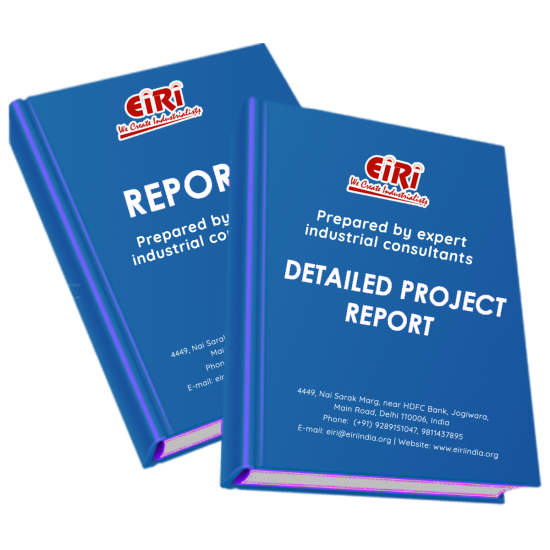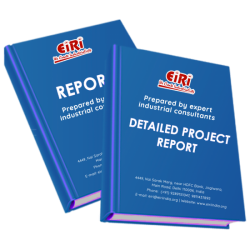Dry Yeast from Molasses (Production Rate- 5 TPD)




- More than 40 years of experience
- Managed by expert industrial consultants
- ISO 9001-2015 Certified
- Registered under MSME, UAM No: DL01E0012000
- 24/5 Research Support
Get your quesries resolved from an industry expert. Ask your queries before report or book purchase. - Custom Research Service
Speak to the our consultant to design an exclusive study to serve your research needs. - Quality Assurance
All reports are prepared by highly qualified consultants & verified by a panel of experts. - Information Security
Your personal & confidential information is safe & secure.
DRY YEAST FROM MOLASSES (PRODUCTION RATE – 5 TPD)
[EIRI/EDPR/4544] J.C.: 2761XL
INTRODUCTION
A yeast is a single-celled fungus capable of causing the fermentation of animal or vegetable organic matter. Yeasts are used to make wine, beer, industrial alcohols, leavened pasta, antibiotics and flavor enhancers.
Yeast is a living unicellular microorganism until it is destroyed by heat or other physical or chemical means of about one hundredth of a millimeter in size and can therefore not be observed with a naked eye. The scientific name of baker’s yeast is saccharomyces cerevisiae.
Yeasts are a group of unicellular microorganisms most of which belong to the fungi division of Ascomycota and Fungi imperfecti. Yeasts have been known to humans for thousands of years as they have been used in fermentation processes like the production of alcoholic beverages and bread leavening. The industrial production and commercial use of yeasts started at the end of the 19th century after their identification and isolation by Pasteur. Today, the scientific knowledge and technology allow the isolation, construction and industrial production of yeast strains with specific properties to satisfy the demands of the baking and fermentation industry (beer, wine, cider and distillates). Food grade yeasts are also used as sources of high nutritional value proteins, enzymes and vitamins, with applications in the health food industry as nutritional supplements, as food additives, conditioners and flavouring agents, for the production of microbiology media, as well as livestock feeds. Yeasts are included in starter cultures, for the production of specific types of fermented foods like cheese, bread, sourdoughs, fermented meat and vegetable products, vinegar, etc.
The significance of yeasts in food technology as well as in human nutrition, as alternative sources of protein to cover the demands in a world of low agricultural production and rapidly increasing population, makes the production of food grade yeasts extremely important. A large part of the earth’s population is malnourished, due to poverty and inadequate distribution of food. Scientists are concerned whether the food supply can keep up with the pace of the world population increase, with the increasing demands for energy, the ratio of land area required for global food supply or production of bioenergy, the availability of raw materials, as well as the maintenance of wild biodiversity (1–4). Therefore, the production of microbial biomass for food consumption is a main concern for the industry and the scientific community.
The impressive advantages of microorganisms for single cell protein (SCP) production compared with conventional sources of protein (soybeans or meat) are well known. Microorganisms have high protein content and short growth times, leading to rapid biomass production, which can be continuous and is independent from the environmental conditions. The use of fungi, especially yeasts, for SCP production is more convenient, as they can be easily propagated using cheap raw materials and easily harvested due to their bigger cell sizes and flocculation abilities. Moreover, they contain lower amounts of nucleic acids than bacteria
There are two types of yeast as compressed yeast. It is convenient to use dry yeast powder for bakeries because its handling is simple and its preservation easy. Dry yeast which can be contained in the form of pillets or flakes in packets or tins. Can be kept for some time in cool, dry conditions.
COST ESTIMATION
Plant Capacity 5 MT/Day
Land & Building (2325 sq.mt.) Rs. 3.48 Cr
Plant & Machinery Rs. 5.21 Cr
Working Capital for 0.5 Months Rs. 35 Lac
Total Capital Investment Rs. 9.51 Cr
Rate of Return 38%
Break Even Point 54%
CONTENTS
INTRODUCTION
IT IS IMPORTANT TO REMEMBER THAT:
USES & APPLICATION
YEAST METABOLISM
PRINCIPAL FUNCTIONS OF YEAST
PROPERTIES OF YEAST
SPECIFICATION
TYPES OF YEAST AND CONDITION
CONDITIONS FOR YEAST
FERMENTATION
DETAILS OF YEAST AVAILABLE TO BAKERS
COMPRESSED YEAST (ALSO CALLED CAKE, WET, AND FRESH YEAST)
ACTIVE DRY YEAST
INSTANT ACTIVE DRY YEAST
OSMOTOLERANT INSTANT ACTIVE DRY YEAST
REHYDRATION
YEAST CONVERSION
TABLE 2 ILLUSTRATES THE CONVERSION FROM COMPRESSED YEAST TO
INSTANT ACTIVE DRY YEAST. (1 OZ IS ROUNDED TO 30 G IN THE TABLE.)
GRADES OF YEAST
FOOD GRADE YEASTS
BAKER’S YEAST
BREWER’S YEASTS
NUTRITIONAL BREWER’S YEAST
WINE YEASTS
DISTILLER’S YEASTS
PROBIOTIC YEASTS
YEAST EXTRACT
TORULA YEAST
AFTER CULTIVATION THE YEAST IS HARVESTED, WASHED,
WHEY YEASTS
MARKET OVERVIEW
PRESENT MANUFACTURES OF BAKER'S YEAST
(INSTANT ACTIVE DRY YEAST)
RAW MATERIALS
YEAST PRODUCTION TECHNOLOGY
MOLASSES
WHEY
STARCH
RESIDUES OF FORESTRY AND AGRICULTURE
PROPAGATION PROCESSES
TREATMENTS AND PACKAGING
YEAST CULTURE &PROPAGATION TO MANUFACTURE BAKERY YEAST
COMPRESSED YEAST (ALSO CALLED CAKE, WET, AND FRESH YEAST)
ACTIVE DRY YEAST
INSTANT ACTIVE DRY YEAST
MANUFACTURING PROCESS OF BAKER’S YEAST
(IADY- INSTANT ACTIVE DRY YEAST)
PROCESS IN DETAILS
TYPICAL PROCESS FLOW DIAGRAM FOR THE SEVEN-STAGE PRODUCTION OF BAKER'S YEAST
FERMENTATION
HARVESTING AND PACKAGING
EMISSIONS
PROCESS FLOW
QUALITY ASSURANCE IN YEAST PROCESSES
PREPARATION
SEEDING
CULTIVATION
HARVESTING
SUPPLIERS OF RAW MATERIALS
PLANT & MACHINERY SUPPLIERS
FERMENTOR
CENTRIFUGE
TRAY DRIER
MIXER
EVAPORATOR
STORAGE TANK
LABORATORY TESTING EQUIPMENTS
GLOBAL PLANT & MACHINERY SUPPLIERS
ENGINEERING DESIGN CONSIDERATIONS
ETP FACILITY
SEWAGE AND WASTE WATER EFFLUENT
PRINCIPLES OF PLANT LAYOUT
MAJOR PROVISIONS IN ROAD PLANNING FOR MULTIPURPOSE SERVICE ARE:
PRINCIPLES OF PLANT LAYOUT
PLANT LOCATION FACTORS
PRIMARY FACTORS
1. RAW-MATERIAL SUPPLY:
2. MARKETS:
3. POWER AND FUEL SUPPLY:
4. WATER SUPPLY:
5. CLIMATE:
SPECIFIC FACTORS
6. TRANSPORTATION:
A. AVAILABILITY OF VARIOUS SERVICES AND PROJECTED RATES
7. WASTE DISPOSAL:
8. LABOR:
9. REGULATORY LAWS:
10. TAXES:
11. SITE CHARACTERISTICS:
12. COMMUNITY FACTORS:
13. VULNERABILITY TO WARTIME ATTACK:
14. FLOOD AND FIRE CONTROL:
ANTICIPATED ENVIRONMENTAL IMPACTS
CONSTRUCTION PHASE
OPERATION PHASE
MITIGATION MEASURES (PROPOSED)
HEALTH SAFETY & ENVIRONMENT
PRELIMINARY LAYOUT
PROJECT FINANCIALS
BASIS & PRESUMPTIONS (FOR PROFITABILITY WORKINGS)
CONCLUSIONS
APPENDIX – A:
01. PLANT ECONOMICS
02. LAND & BUILDING
03. PLANT AND MACHINERY
04. OTHER FIXED ASSESTS
05. FIXED CAPITAL
06. RAW MATERIAL
07. SALARY AND WAGES
08. UTILITIES AND OVERHEADS
09. TOTAL WORKING CAPITAL
10. TOTAL CAPITAL INVESTMENT
11. COST OF PRODUCTION
12. TURN OVER/ANNUM
13. BREAK EVEN POINT
14. RESOURCES FOR FINANCE
15. INSTALMENT PAYABLE IN 5 YEARS
16. DEPRECIATION CHART FOR 5 YEARS
17. PROFIT ANALYSIS FOR 5 YEARS
18. PROJECTED BALANCE SHEET FOR (5 YEARS)
How to Make Project Report?
Detailed Project Report (DPR) includes Present Market Position and Expected Future Demand, Technology, Manufacturing Process, Investment Opportunity, Plant Economics and Project Financials. comprehensive analysis from industry covering detailed reporting and evaluates the position of the industry by providing insights to the SWOT analysis of the industry.
Each report include Plant Capacity, requirement of Land & Building, Plant & Machinery, Flow Sheet Diagram, Raw Materials detail with suppliers list, Total Capital Investment along with detailed calculation on Rate of Return, Break-Even Analysis and Profitability Analysis. The report also provides a birds eye view of the global industry with details on projected market size and then progresses to evaluate the industry in detail.
We can prepare detailed project report on any industry as per your requirement.
We can also modify the project capacity and project cost as per your requirement. If you are planning to start a business, contact us today.
Detailed Project Report (DPR) gives you access to decisive data such as:
- Market growth drivers
- Factors limiting market growth
- Current market trends
- Market structure
- Key highlights
Overview of key market forces propelling and restraining market growth:
- Up-to-date analyses of market trends and technological improvements
- Pin-point analyses of market competition dynamics to offer you a competitive edge major competitors
- An array of graphics, BEP analysis of major industry segments
- Detailed analyses of industry trends
- A well-defined technological growth with an impact-analysis
- A clear understanding of the competitive landscape and key product segments
Need Customized Project Report?
- Ask for FREE project related details with our consultant/industry expert.
- Share your specific research requirements for customized project report.
- Request for due diligence and consumer centric studies.
- Still haven't found what you're looking for? Speak to our Custom Research Team
About Engineers India Research Institute:
Note: We can also prepare project report on any subject based on your requirement and country. If you need, we can modify the project capacity and project cost based on your requirement.
Our Clients

Our Approach
- Our research reports comprehensively cover Indian markets (can be modified as per your country), present investigation, standpoint and gauge for a time of five years*.
- The market conjectures are produced on the premise of optional research and are cross-accepted through associations with the business players
- We use dependable wellsprings of data and databases. What's more, data from such sources is handled by us and incorporated into the report
Why buy EIRI reports?
- Our project reports include detailed analysis that help to get industry Present Market Position and Expected Future Demand.
- Offer real analysis driving variables for the business and most recent business sector patterns in the business
- This report comprehends the present status of the business by clarifying a complete SWOT examination and investigation of the interest supply circumstance
- Report gives investigation and top to bottom money related correlation of real players/competitors
- The report gives gauges of key parameters which foresees the business execution






















